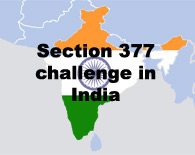On Wednesday, the Delhi High Court will begin final arguments in the constitutional challenge to Section 377 of the Indian Penal Code, 1860, which criminalises 'carnal intercourse against the order of nature'. Filed in 2001 by the Naz Foundation, a NGO working on HIV/AIDS and sexual health issues, the petition points to that the provision criminalises private sexual acts between consenting adult men. Naz Foundation is broadly arguing that this provision is hampering efforts at HIV/AIDS prevention and treatment since it drives gay men underground, and that it violates the constitutionally protected rights of equality and privacy.

In October 2007, a coalition of human rights, LGBT rights, women's rights and child rights organisations, known collectively as 'Voices Against 377' became a party to the case. They argued that Section 377, while rarely used in actual prosecutions, is used to target lesbian, gay, bisexual and transgendered people, and that sexual minorities face discrimination, harassment, blackmail, violence, rape and even murder as a result of this law.
Oral Hearings
Seven years after it was filed, final oral arguments began on Monday, May 19 before Justices Sikri and Midha of the Delhi High Court.
The proceedings began on an amusing note with the federal Home Ministry upholding the law and the federal Health and Family Welfare Ministry all but supporting Naz Foundation against Section 377. The Home Ministry, in its affidavit, says the law is right as Indians largely disapprove of homosexuality and that the law should continue as a deterrent for such kind of "immoral" acts.
The Ministry of Health and Family Welfare however, in its affidavit, says it is against enforcement of Section 377 as it pushes homosexual men underground, hampering efforts to control the spread of HIV/AIDS among this high risk population.
Monica Garg, the lawyer for the federal government, told an amused Court that she would argue the brief of the Home Ministry but also draw from arguments made by the Health and Family Welfare Ministry.
Anand Grover, lawyer for the Naz Foundation, introduced the case to Justices Sikri and Midha. Before a packed courtroom, he set out the structure of his case and said that the Naz Foundation challenges the constitutional validity of Section 377, on the grounds that it violated certain fundamental rights guaranteed under the Indian Constitution, namely Articles 14 (equality), 15 (non-discrimination), 19 (freedom of speech and expression) and 21 (life and liberty).
The anti-sodomy law presently on the statute books in India, was taken by the British to all its colonies. Mr Grover pointed out however, that not only has the law been repealed or struck down in many of its former colonial possessions, like Canada, Australia and more recently Fiji and Hong Kong, but was also repealed by the United Kingdom, the birth place of the law, more than 40 years ago. He began his arguments by drawing upon the history of the section 377 and traced it back to biblical injunctions against buggery, and which found expression in British law as the 'vice to horrible to be named.'
The apparent disgust with even naming or describing sodomy, is similarly expressed by Lord Macaulay, who drafted the provisions of the Indian Penal Code in the middle of the nineteenth century. He said that the provisions "relate to offences respecting which it is desirable that as little as possible be said� we are unwilling to insert either in the text or in the notes anything which could give rise to public discussion on this revolting subject, as we are decidedly of the opinion that the injury which could be done to the morals of the community by such discussion would more than compensate for any benefits which might be derived from legislative measures framed with greatest precision."
Mr Grover, stated that it is this refusal to define the offence clearly is what rendered the provision unconstitutional. The offence criminalises 'carnal intercourse against the order of nature' and he argued that it is not clear, on the face of it, of what this means. He argued that the section 377's vagueness runs counter to any basic principle of modern criminal and constititonal law that a penal law must be clear and precise and everyone should know exactly what the law penalises. In its 148-year history, there have been a few reported cases and even in those cases there has been considerable debate on what sexual acts the section covered.
He further argued that the law was unconstitutional because it did not take into account elements of consent. He said that the law was problematic particularly because it criminalised homosexual acts between adults even where the people involved consented to these acts.
He then referred to the Wolfenden Committee report of the United Kingdom, which recommended the repeal of the British sodomy laws. Relying upon the point in that report that the enforcement of morals on acts committed in private was not the domain and proper function of criminal law, he stated that the very same question now presented itself before the Delhi High.
Mr Grover is expected to continue his oral arguments till early next week. With Court holidays starting at the end of June for a month, a decision is not expected within the immediate future. The Court adjourned the matter and set the next date of hearing on May 21.
Mayur Suresh is a lawyer in New Delhi. He will continue to report on the case.











 打印版本
打印版本










读者回应
Awaiting next instalment with baited breath and fingers crossed.
Keep the articles rolling!
consensual sex is free and should always be .
the general public does not approve , well i do not need your approval.
it is our body and our live , legislate your own body not ours
请先登入再使用此功能。